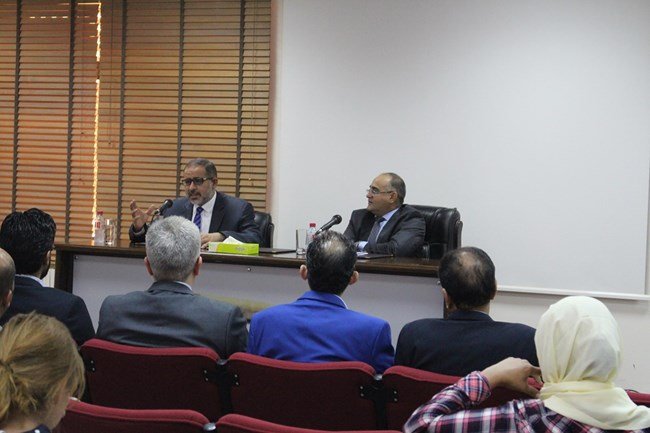Image:

26 Jul 2017
<span style="background-color:rgb(239, 243, 251); font-family:arial,sans-serif; font-size:12.8px">7/26/2017</span><br />
Libyan politician Aref Nayed, head of the Libya Stabilization Team and former ambassador to the United Arab Emirates, has expressed optimism about holding parliamentary and presidential elections in his country next year. He pointed out that any political or religious party or trend that does not respect human rights and the results of the elections must not be given a chance to enter the democratic game because it will seek to hijack it. "The one who does not believe in democracy cannot be a part of it," he said.<br />
<br />
In a lecture at the Jordan Media Institute (JMI) titled "Libyan Crisis and Media Conflict in Region," Nayed welcomed any regime brought by ballot boxes in Libya provided that it does not carry arms in the face of any citizens. He called for guarantees, even if they were military, to support the results of these elections so that no party will turn against these results. He said that "it is time for the United Nations to be decisive in this in order to ensure holding the elections in an ideal manner." <br />
<br />
On the date of holding the elections, Nayed said that Libya is ready, from a security angle, to hold them, especially in the wake of "the liberation of Benghazi." He said that he, along with a number of parties, is seeking to have the elections held in December this year instead of March 2018.<br />
<br />
Regarding the media situation that Libya is currently witnessing and the media conflict between the warring factions on the ground, Nayed, who heads the board of Libya Satellite Channel, said that war media and conflict-driven media is different from balanced and objective media in times of peace because conflict overshadows all media standards. He indicated that the most important question now, once the battle is over, is: What is the role of the media in the stage of rebuilding the state? Most media theories have emerged after the end of wars. <br />
<br />
Nayed believes that the most important role of the media, after the end of the war, would be psychological and developmental. The media should be for peace and life, instead of images of mobilization, killing and displacement. The media must accommodate the other within certain controls and boundaries. The media must fulfill the ambitions of Libyan youth and support the army, accord, and peace. It must also delegitimize terrorist groups. <br />
<br />
In addition to elections and media, Nayed spoke about the Libyan revolution and its beginning, saying that the main reason for its decline was the lack of a plan for the stage that follows the success of the revolution and how the country would be run after the fall of the Gaddafi regime, especially since the former regime had reduced all state institutions to the person of the president. <br />
<br />
Nayed pointed out that the Libyan army failed to protect the revolution as it was exhausted after the end of the war with Chad. Thus, the Gaddafi regime relied on security forces to protect the regime, and not the Libyan state. Besides, NATO strikes had completely wiped out what remained of the Libyan army, let alone opening weapons depots, allowing radical groups to take possession of these weapons. This caused the spread of chaos and the collapse of the state.<br />
<br />
On other reasons for the deterioration of the security situation in the country after the revolution, Nayed spoke about the role of the Muslim Brotherhood, which established an alliance with the Libyan Islamic Fighting Group, in controlling key components of the state and turning against the results of the elections that took place in the country. The Libyan people chose, through ballot boxes, to exclude them from the political game. "However, their ability to skillfully handle the political game" led to their control of the Libyan capital. No other organization managed to match them. They relied on their organizational experience, which dates back more than 80 years and on "military support from abroad." <br />
<br />
Answering questions by JMI students, Nayed said that dividing Libya is out of the question and that those invoking division are only expressing their anger, but do not mean division per se. Libyan unity will remain and continue, even if it is fragile, he said, adding that the Libyan army cannot afford division as its components come from different regions. However, the support of some countries for some parties in the Libyan east and west gave a general impression that Libya is heading toward division. <br />
<br />
Dr. Aref Nayed is a researcher and thinker specialized in philosophy and interfaith dialogue. He worked as senior adviser to the Cambridge Interfaith Program and fellow at the Royal Aal Al-Bayt Institute in Jordan. He contributed to "A Common Word," which is considered one of the most important contemporary initiatives of interfaith dialogue. <br />



